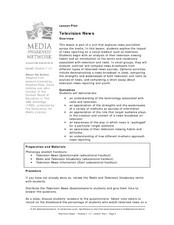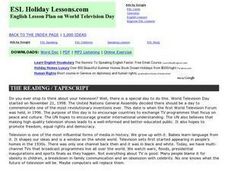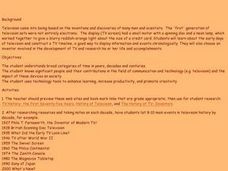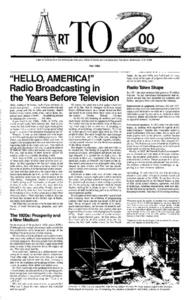Media Smarts
Violence on Television
Focus on a specific incident of violence on television in the case of the Canadian Broadcast System showing Silence of the Lambs on public television. Look at the broadcasting codes and a complaint that was filed against the Association....
Curated OER
Television Newscasts
When we watch news broadcasts on television, we receive a much more visual perspective than when we read the newspaper. How do sets, clothing, and music contribute to our understanding of the story? Compare American and Canadian news...
Curated OER
Television News
Different media sources portray news in a variety of ways. In groups of three, learners look at different news sources, bringing in all the findings the next day. Three handouts help scholars compare sources, define specific terms used...
Curated OER
Diversity in Media: Looking Critically at What We See
This learning experience fosters awareness of representations we see, and don't see, in the media. Learners list TV programs, games, and films they enjoy, identify characters' ethnic, religious, (dis)ability, and sexual orientation...
Curated OER
Ancient Cultures News Broadcast
How does geography influence daily life? Guided by an essential question, class groups select and then research an ancient culture, and develop a news broadcast about the geographical setting and its impact on the culture. Teams select...
Media Smarts
Television Broadcast Ratings
Explore the relationships between programming, advertising, and the ensuing rating wars. Help develop the media smarts of your pupils through this examination of advertisers for popular shows. Although the included Sweep Chart features...
Curated OER
"War of the Worlds": A Broadcast Re-Creation
Why did Orson Welles' 1938 Broadcast of a adaptation of H.G. Wells' The War of the Worlds cause such a panic? To answer this question, class members listen to the original broadcast and research the panic that resulted. They then engage...
Curated OER
Newscast From An Ancient City
Seventh graders produce a newscast from an Ancient Roman city. For this journalism and history lesson, 7th graders work in groups to dramatize a historical event from the Roman Empire. students sequence the events, role-play, and create...
Curated OER
Create a Weather Newscast
Fourth graders explore and study basic weather terms, strengthen research skill on the web and create a weather newscast. They choose a weather site on the web, copy weather maps and create a videotape based on a written script to...
Curated OER
World Television Day
In this World Television Day worksheet, students complete activities such as reading a passage, matching phrases, fill in the blanks, multiple choice, spelling, sequencing, unscrambling sentences, writing questions, take a survey, and...
Curated OER
Using a Graphic Organizer to Critically Observe Televised News Broadcasts
Students compare two television news broadcasts. They discuss how to organize information when comparing two objects and read and discuss two books to create a Venn diagram to compare both books. After creating the diagram, they view...
Curated OER
News
How does broadcast news differ from accounts reported in newspapers? On the radio? Through the Internet? Middle schoolers discuss the news and speak about the differences between news in print and broadcast news. Given a list of six...
Curated OER
Jumping Off the Bandwagon
Teach your class to be critical consumers by studying persuasion in advertising.
Curated OER
This Just In…
Students consider the impact a reporter has on broadcast journalism. They research a famous broadcast journalist to prepare a mock news report.
Curated OER
Anchors Away
Learners examine forms of broadcast journalism. they identify roles played by journalists in various news formats.
Curated OER
Be a Weather Newscaster
Ninth graders, in groups, create and videotape a news broadcast. Each group researches, develops and writes a weather forecast, a commentary on an environmental concern, a school activity and a commercial.
Curated OER
History of Television
Students investigate the history of Television by using the Internet. In this timeline lesson plan, students discuss and take notes on the 10 main events in Television history and create a timeline through education software. Students...
Curated OER
Shaping the News
Students explore television journalism. In this journalism activity, students discuss the attributes of television broadcasting. Students then review their journalism code of ethics and then conduct research for stories that have a moral...
Curated OER
The Weekly News, Part 2
Sixth graders use articles they've previously written to produce a school news broadcast. For this journalism lesson, 6th graders discuss the goals of a news broadcast and use previously written articles to plan a news broadcast....
Curated OER
The World in 22 Minutes: Constructing a TV News Lineup
Students examine several newspapers to compare front pages, headlines, and photographs, experience role of news editor, define and discuss factors that go into news judgements, and arrange twenty-two minute news broadcast by selecting...
Curated OER
Radio Broadcasting Before Television
Students compare the radio to other forms of mass communication. In this Radio Broadcasting Before Television lesson, students learn the different types of radio shows in the 1920s and 30s. Students write and perform radio scripts...
Curated OER
Power and Impact of Radio as a Broadcast Medium
Students compare radio coverage of news events with coverage of 21st century new stories. They analyze various forms of media as they relate to news coverage. They write an essay comparing the impact of radio versus that of television
Curated OER
Edward R. Murrow: This Reporter
What would Edward R. Murrow think of today’s news broadcasts? Learners examine the work of the first public television newscaster and his commitment to researched, accurate reporting. The eight-day study concludes with investigators...
Curated OER
Back to the Past
What was the Untied States like in 1938? What were the concerns of Americans in the post World War I era? What were their fears? What were their sources of news and entertainment? To understand the reaction to Orson Welles' radio...

























